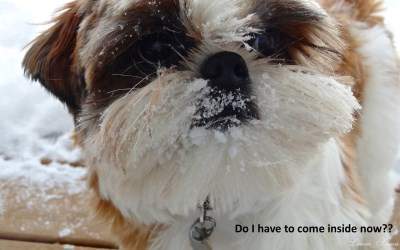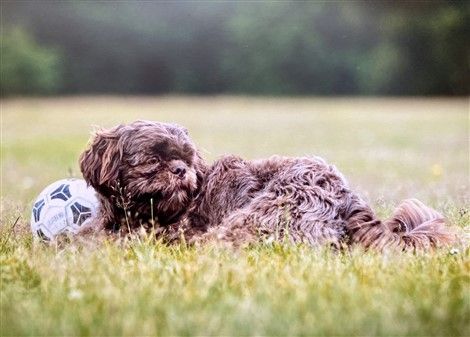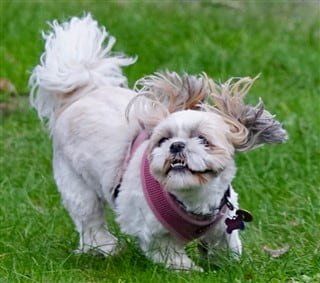Exercise
Exercise and Activity Requirements for the Shih Tzu


Overview
It's important to provide just the right balance of exercise for Shih Tzu dogs. Regular cardiovascular activity plays a big role in both physical and emotional health. Yet, since the Shih Tzu is a brachycephalic breed, it's also vital to take precautions to avoid over-heating.
This article will cover everything you need to know including the top benefits of exercise, daily requirements, and tips for both indoor and outdoor activity.
Please note: AllShihTzu is reader-supported. Some links below are affiliate links, meaning we may earn a small commission on products through these, at no extra cost to you.
The Benefits of Exercise for a Shih Tzu
It cannot be overstated just how important regular exercise is for Shih Tzu dogs. It is healthy in the following ways:
- Strengthens a dog's heart and improves blood circulation (for fewer heart-related issues down the line)
- Helps the body manage glucose levels (reducing the chances of developing canine diabetes later in life)
- Is thought to play a role in keeping the immune system strong and even extending life span.
- Strengthens a dog's bones and supporting muscles (for fewer hip and knee issues)
- Helps keep the metabolism functioning properly
- Helps stimulate the appetite
- Aids in a good night's sleep
- Allows a dog to engage their canine senses (hearing, scenting, sight), which often leads to a more emotionally satisfied dog
- Helps a dog release pent-up energy that may otherwise be directed toward behaviors like excessive barking or chewing
- Outdoor exercise can enable a Shih Tzu to be exposed to stimuli, which eventually leads to less reaction (i.e. barking at other dogs)
So, as you can see, exercise plays a huge role in your Shih Tzu's overall health. Allowing your little guy or gal to remain sedentary can be very detrimental.
How Much Exercise a Shih Tzu Needs
At a bare minimum, healthy puppies 6+ months and adult Shih Tzu should have 1 walk per day for a duration of 20 minutes, done at a pace considered brisk for your particular dog.
The ideal daily exercise for Shih Tzu
is 2 walks per day, each lasting a duration of 20 to 30+ minutes, done at a pace considered brisk for your particular dog. Additional supervised and controlled cardio sessions can be added in, anywhere from 1 to 3 times per day.
When You Can Start Exercising a Shih Tzu
Young puppies should have all of their puppy shots before being taken outside to any public places (such as walks in the neighborhood) or even into the yard (if there is any chance that other dogs or wildlife has been there). Though vaccination schedules for Shih Tzu puppies
can vary, most puppy shots are complete by the 4-month mark; be sure to check with your vet regarding this.
Tuppence, photo courtesy of Maureen
Walking Tips
Walking is one of the best types of exercise for a Shih Tzu. Since there is a starting and ending point it helps ensure proper duration and the pace can be controlled.
Here's some tips to make things easier:
1. Stick to a schedule.
Whenever something is scheduled, it's more likely to be done. And, since dogs have excellent inner time clocks, your Shih Tzu will quickly learn to look forward to their walks.
2. Use a harness, not a collar.
Brachycephalic breeds like the Shih Tzu should wear a harness, not a collar, when on a leash. A collar is constricting to the windpipe which can increase breathing issues. Yet, a harness displaces pressure across the chest, shoulders, and back and leaves the neck free. One recommended brand is the Puppia Harness Soft B Vest .
.
3. Keep your Shih Tzu in a heeling position.
This means to your left side and no further ahead of you than the extension of your foot. This allows you to be in control instead of your Shih Tzu walking you. As an added plus, this reinforces proper hierarchy (alpha/beta ranking).
4. Bring along water.
Use a water travel container like the lesotc Water Bottle for Dogs
 and plan to take a break at the halfway mark. If your Shih Tzu is panting heavily or otherwise appears to be over-heating, take the break immediately and offer a rest in the shade and a drink of water.
and plan to take a break at the halfway mark. If your Shih Tzu is panting heavily or otherwise appears to be over-heating, take the break immediately and offer a rest in the shade and a drink of water.
Wintertime Exercise Tips
It's common for dogs to receive less exercise in the wintertime, but being active only part of the year can have consequences, both short and long-term. Here are some tips to help ensure your Shih Tzu is meeting their exercise requirements during even when it's snowing or the temps have plummeted.
1. Help your Shih Tzu stay warm.
Placing a water-proof and wind-proof coat on your Shih Tzu, like the Kuoser Cozy Reversible British-Style Cold Weather Coat , that protects a dog's core body, can make being outside a lot more tolerable.
, that protects a dog's core body, can make being outside a lot more tolerable.
2. Dress warm yourself.
If you feel comfortable, you'll be more apt to take the full walk or remain outside with your little guy or gal for the intended time.
3. Regularly apply paw wax on your Shih Tzu's feet.
The paws can take a beating all year-round, but winter is one of the worst seasons in this regard. Paws can easily get dried out, be irritated by road salt or sand, and have skin between the toes stretched out due to 'snowballing' (when snow melts but quickly refreezes in that area). Paw wax like Musher's Secret Pet Paw Protection Wax
 will help stop all of those issues as well as give a Shih Tzu better traction on slippery surfaces.
will help stop all of those issues as well as give a Shih Tzu better traction on slippery surfaces.
4. Limit outside exercise under certain conditions.
When there is very wet precipitation and/or temps are below freezing, limit outdoor activity to 20 minutes. During snowstorms or other dangerous inclement weather conditions, opt to have your Shih Tzu exercise indoors instead (details ahead).

Porter, at 10 months old, photo courtesy of Laura Toma
Summertime Exercise Tips
Exercising a Shih Tzu in the summertime
can be tricky. During hot weather, care must be taken for canines in general. But when you have a brachycephalic breed (compressed skull, and therefore compressed breathing passages), extra precautions should be taken.
Here are some tips for safe summertime exercise:
1. Head outside before 10 AM and after 5 PM.
Usually, these are the coolest parts of the day.
2. Reassess the walking route.
Hot pavement that can burn paws (see next tip) and direct sunlight (that can more quickly lead to over-heating) are the main elements to try to avoid. If your Shih Tzu's regular walking route does not provide it, consider making changes to include walking over grass and/or in the shade.
3. Be aware of possible hot walking surfaces.
Every year, hundreds of dogs suffer from terrible burns on their paws, so never underestimate what can happen. A dog's pain threshold is about 120 F (49 C) and at 140 F (60 C) a dog's paws will suffer burns after just one minute of contact.
But, can pavement really heat up that high if you take your Shih Tzu for a walk in the summer? The answer may surprise you. Studies have shown that red brick, cement, and blacktop pavement have all heated up passed 120 F (and up to 140 F) on sunny days in the low 90's.
A good rule of thumb is that if you can hold your palm to the ground for a count of 10, it's safe for your dog to walk on (just be careful doing this). And note that paw wax, as discussed earlier,
can certainly offer a layer of protection but should not be counted on to prevent burns under such extreme conditions.
4. Bring along water.
As covered earlier, Shih Tzu dogs should be given breaks when exercising and this is especially so on hot days.
5. Know the signs of heat stress and react quickly.
Keep an eye on your Shih Tzu for signs that they are overheating. If it is caught early and intervention is given, heat stroke can be averted.
Signs include rapid panting, bright red tongue, red or pale gums, thick/sticky saliva, weakness, and/or dizziness. If this is suspected, stop all activity. Bring your Shih Tzu into an air-conditioned room (or if that is not possible, into the shade) and offer small sips of water.
If your dog still seems distressed, call the vet. Treatment may include bringing down body temperature at home (before transporting) which involves placing cool wet rags on the body and using a fan to circulate the air around the body.

Buddy, at 15 months old, photo courtesy of Shelly C.
Tips for Playing Fetch
This is a quintessential game for a reason and is an excellent way to engage a dog in some healthy cardio in which the pace is easily controlled by you. And, if you've tried this but think that your Shih Tzu doesn't like playing fetch, it may just be a matter of making a few adjustments.
Here are some tips to make fetch part of your Shih Tzu's regular exercise:
1. This is best played outside in an enclosed area, so if you have a fenced-in yard, that'll make things easier.
2. But, you can play this outside when your Shih Tzu on a long retractable leash or even inside
(see next section).
3. To encourage your Shih Tzu to chase, use a brightly colored and interesting fetch toy. Something like Zanies Mini Tennis Balls for Dogs
 can be a lot of fun. Be animated and use an excited voice to rev them up; saying 'Are you ready?... are you ready?.... ' then toss it and give an enthusiastic 'Go get it!'. Start with close tosses, just a few feet away, gradually adding distance as your Shih Tzu catches on.
can be a lot of fun. Be animated and use an excited voice to rev them up; saying 'Are you ready?... are you ready?.... ' then toss it and give an enthusiastic 'Go get it!'. Start with close tosses, just a few feet away, gradually adding distance as your Shih Tzu catches on.
4. To encourage your Shih Tzu to return the toy to you, use training treats. Keep a handful of something like Zuke's Mini Natural Dog Training Treats
 in a jacket pocket or training treat bag. Start with close tosses. Ask for the toy back. As soon as your Shih Tzu follows through, mark the moment with one treat and an enthusiastic 'Good dog!'.
in a jacket pocket or training treat bag. Start with close tosses. Ask for the toy back. As soon as your Shih Tzu follows through, mark the moment with one treat and an enthusiastic 'Good dog!'.
Have at least 5 successful sessions at a certain distance before tossing the toy a bit further. Each day, work on increasing the distance. Once your Shih Tzu catches on, you can slowly phase out the treats and just use praise.
5. Always end the game when your Shih Tzu is still interested, as opposed to when they are tired or bored of it. This way, they will be more prone to wanting to play again.
Indoor Exercise Tips
Though outdoor exercise certainly has its advantages, indoor exercise does have its place, such as when it's pouring or heavily snowing. This should not be the main method of keeping your Shih Tzu active, but rather as an alternative when circumstances dictate a day indoors.
Here are some tips to make indoor exercise effective for your Shih Tzu:
1. One of the best (and easiest) games to play inside is fetch.
It's a classic game for a reason. Most dogs love chasing after things, and all you need is a fun (and safe) indoor toy like the Chuckit! Indoor Ball for Small Dogs . This can be played down a hallway or in just about any room (obviously, the larger the better and if it's not a hassle, try moving some furniture out of the way).
. This can be played down a hallway or in just about any room (obviously, the larger the better and if it's not a hassle, try moving some furniture out of the way).
2. Time the session.
Sometimes 5 minutes can seem like 20, or vice-versa, so it's best to time it.
3. Your level of enthusiasm can play a big role.
If a toy is halfheartedly thrown and you're not showing any real joy when it's returned, your Shih Tzu may not last long. Act excited and your little guy or gal may start to mimic you.
Do you have your book?
Check out AllShihTzu's GIANT Book of Shih Tzu Care. This is our newest book and is the most comprehensive book of its kind. We've made this available in both a softcover book and PDF eBook.
Are you a site member?
Stay up-to-date. Become a free site member, to start receiving our newsletters and to be able to submit photos. You'll also receive a fun Welcome eBooklet. Signing up is 100% free and let's us stay in touch!
You may also like:
Shih Tzu Physical Comfort - How to address the top 5 concerns of: Sensitive skin, tummy troubles, cold intolerance, breathing discomfort and mobility issues in Shih Tzu dogs. Help your Shih Tzu start feeling better today.
Shih Tzu Body Language - The many ways that your sweet Shih Tzu tries to communicate with you. A great, quick read that can lead to better bonding.
Shih Tzu Snorting and Snoring Noises
- Some noises are normal for this breed. See what to expect both when a Shih Tzu is sleeping and when awake.
Shih Tzu Allergies
- Allergies can develop at any time. Tips and advice when a Shih Tzu has allergies; includes food, airborne and contact triggers. In many cases, this can be treated with home remedies.
Giving a Shih Tzu a Bath
- Scrub-a-dub, it's time for a bath! The technique you use and the products you apply to the coat will make a big difference into both skin and coat health and how your Shih Tzu tolerates baths.
As an Amazon Associate, we earn from qualifying purchases. We are a participant in the Amazon Services LLC Associates Program, an affiliate advertising program designed to provide a means for us to earn fees by linking to Amazon.com.
Email: Contact@AllShihTzu.com
All text and images are protected by copyright laws. All rights reserved.

